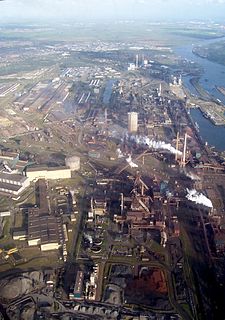
British Steel plc was a major British steel producer. It originated from the nationalised British Steel Corporation (BSC), formed in 1967, which was privatised as a public limited company, British Steel plc, in 1988. It was once a constituent of the FTSE 100 Index. The company merged with Koninklijke Hoogovens to form Corus Group in 1999.

Stocksbridge is a town and civil parish, in the City of Sheffield, in South Yorkshire, England. Historically part of the West Riding of Yorkshire, it lies just to the east of the Peak District. The town is located in the steep-sided valley of the Little Don River, below the Underbank Reservoir. It blends into the areas of Deepcar, Bolsterstone and the eastern end of Ewden valley around Ewden village, which are also within the civil parish. The population of the civil parish as of the 2011 census was 13,455.

The Tata Steel Chess Tournament is an annual chess tournament held in January in Wijk aan Zee, the Netherlands. It was called the Hoogovens tournament from its creation in 1938 until the sponsor Koninklijke Hoogovens merged with British Steel to form the Corus Group in 1999, after which the tournament was called the Corus chess tournament. Corus Group became Tata Steel Europe in 2007. Despite the name changes, the series is numbered sequentially from its Hoogovens beginnings; for example, the 2011 event was referred to as the 73rd Tata Steel Chess Tournament.
Tata Steel Europe Ltd. is a steelmaking company headquartered in London, United Kingdom, with its main operations in the United Kingdom and the Netherlands.
Dorman Long is an engineering consultancy and equipment manufacturer for the construction of long-span bridges, power stations, refineries, offshore structures, stadia and other large building structures. Originally based in Middlesbrough, northeast England, the company was a major steel producer later diversifying into bridge building. Dorman Long was once listed on the London Stock Exchange.

Koninklijke Hoogovens known as Koninklijke Nederlandse Hoogovens en Staalfabrieken (KNHS) until 1996 or informally Hoogovens. was a Dutch steel producer founded in 1918.
Samuel Fox and Company or "Fox's" was a company operating a major steel complex built in the Upper Don Valley at Stocksbridge, near Sheffield, South Yorkshire, England.

John Summers & Sons Ltd was a major United Kingdom iron and steel producer, latterly based at Shotton, Flintshire. The company was absorbed into British Steel Corporation in 1967; British Steel became Corus in 1999 and this company was taken over by Tata Steel in 2007.

The Teesside Steelworks is a large expanse of steelworks that formed a continuous stretch along the south bank of the River Tees from the towns of Middlesbrough to Redcar in North Yorkshire, England. At its height there were 91 blast furnaces within a 10 mile radius of the area. By the late 1970s, there was only one left on Teesside. Opened in 1979 and located near the mouth of the River Tees, the Redcar blast furnace was the second largest in Europe.

Llanwern steelworks is located in Llanwern, east of the City of Newport, South Wales.
The HIsarna ironmaking process is a direct reduced iron process for iron making in which iron ore is processed almost directly into liquid iron (pig iron). The process combines two process units, the Cyclone Converter Furnace (CCF) for ore melting and pre-reduction and a Smelting Reduction Vessel (SRV) where the final reduction stage to liquid iron takes place. The process does not require the manufacturing of iron ore agglomerates such as pellets and sinter, nor the production of coke, which are necessary for the blast furnace process. Without these steps, the HIsarna process is more energy-efficient and has a lower carbon footprint than traditional ironmaking processes. In 2018 Tata Steel announced it has demonstrated that more than 50% CO2 emission reduction is possible with HIsarna technology, without the need for carbon capture technology.
Mekog was a chemical company founded 1928 that manufactured fertilizer using hydrogen from coke oven gas as a feedstock. The company's facilities were located on the site of the Koninklijke Nederlandsche Hoogovens en Staalfabrieken steelworks near IJmuiden in the Netherlands.

The Iron and Steel Industry in Scunthorpe was established in the mid 19th century, following the discovery and exploitation of middle Lias ironstone east of Scunthorpe, Lincolnshire, England.

Trostre Steelworks is a tinplate manufacturing facility located in Pemberton, Carmarthenshire, just outside Llanelli, West Wales. Planned by the Steel Company of Wales in 1947, today it is part of Tata Steel Europe's infrastructure.
The Materials Processing Institute is a research centre serving organisations that work in advanced materials, low-carbon energy and the circular economy. The Institute is based in Tees Valley in the northeast of England.
Skinningrove steelworks is a steel mill in Skinningrove, North Yorkshire, England. The business was formed in 1874 as the Loftus Iron Company, after a liquidation of the company reformed in 1880 as the Skinningrove Iron Company. The works expanded from producing only pig iron to include steel production in the early 20th century, with mills specialising in long products including railway rail. As part of the business the company constructed a jetty at Skinningrove, and owned an ironstone mine in Loftus.

The Clydebridge Steelworks, also known as Clydebridge Works, is a steel works in South Lanarkshire, Scotland.

Redcar Bulk Terminal (RBT), also known as Redcar Ore Terminal, is a privately run dock at the mouth of the Tees Estuary in North Yorkshire, England. The port is used for the transhipment of coal and coke and for many years was the import dock for iron ore destined for Redcar Steelworks under British Steel Corporation, British Steel plc, Corus, Tata Steel Europe and SSI UK.